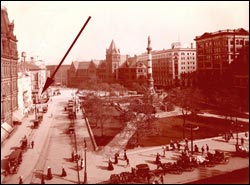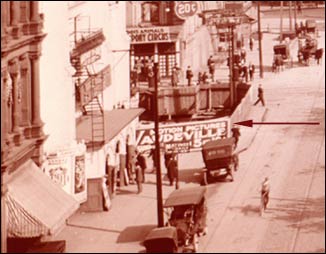|
From 1905 to 1912,
thousands of small movie houses, called nickelodeons for their
cheap admission price, appeared in American cities. These tiny
theaters provided accessible and affordable entertainment to workers
and immigrants.
Nickelodeons offered
cheap and convenient entertainment for urban workers. The flexible
time schedule of nickelodeon shows made it easy for them to attend.
Women and children also made up a substantial portion of the nickelodeon's
audience. Immigrants found no language barriers in the exciting
pantomimes of the moving pictures.
Nickelodeons were
typically converted stores equipped with simple wooden chairs,
a projector, a canvas screen and a piano for musical accompaniment
to the silent films. The outside of the Nickelodeon was alive
with electric lights, painted signs and colorful movie posters.
Inexpensive to build and operate , nickelodeons were a wildly
successful innovation.
Experience a re-creation of a nickelodeon inside Henry Ford Museum and learn about more technologies that shaped Americans over the past 100 years in our newest exhibit, "Your Place in Time: 20th Century
America!"
|

Buffalo, New York from the Detroit Publishing Company Photograph Collection, 37.102. (Box 17) Click to enlarge

Detail of above. |

